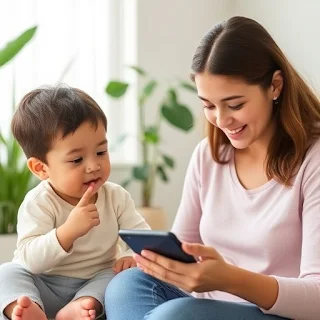Mindful Parenting for the Digital Age: Techniques and Tips
Mindful Parenting for the Digital Age: Techniques and Tips
Parenting in the digital age comes with unique challenges: screen addiction, emotional disconnection, and the mental health crisis among children. Mindfulness, a practice rooted in ancient traditions, offers modern parents powerful tools to nurture emotional resilience and well-being in their children. In this guide, we’ll explore practical mindfulness techniques tailored for Gen Alpha, empowering parents and teachers alike to create lasting positive change.
Why Mindful Parenting is Crucial Today
With technology deeply embedded in children’s lives, emotional and mental well-being often takes a backseat. According to recent studies, over 70% of parents report concerns about their child’s screen time, while rates of anxiety and depression in children have surged over the past decade. Mindful parenting addresses these challenges by fostering presence, empathy, and emotional regulation, helping children thrive in an increasingly digital world.
Challenges Modern Parents Face
- Screen Addiction: Excessive screen time hampers focus, creativity, and social skills.
- Emotional Disconnect: The fast-paced nature of digital life often leaves little room for genuine connection.
- Mental Health Concerns: Rising stress levels among children are leading to anxiety, poor self-esteem, and behavioral issues.
Addressing these challenges requires innovative solutions that align with the realities of modern parenting.
Solutions: Practical Mindfulness Exercises for Parents and Kids
Mindfulness isn’t just meditation; it’s about creating moments of awareness in daily life. Here are actionable techniques:
- Mindful Breathing: Teach children to take deep, slow breaths when feeling overwhelmed. Use visual cues like imagining a balloon inflating and deflating.
- Gratitude Journals: Encourage kids to write three things they’re grateful for each day to shift focus from stress to positivity.
- Mindful Eating: Share meals mindfully by noticing colors, textures, and tastes. This promotes focus and reduces over-eating.
- Digital Detox Sessions: Designate "screen-free" hours where the family engages in offline activities like board games, nature walks, or storytelling.
Real-Life Success Stories
Parents worldwide are embracing mindful parenting with incredible results. Here’s an inspiring example:
Sarah, a working mom, struggled to connect with her 8-year-old son, Adam, who was addicted to video games. By incorporating 10 minutes of mindful breathing and a gratitude practice into their daily routine, Adam’s focus improved, and their bond strengthened significantly.
Tools and Resources for Mindful Parenting
- Mindfulness Apps: Explore apps like Headspace and Calm for guided meditations tailored to children.
- Books: "Planting Seeds" by Thich Nhat Hanh offers mindfulness practices for families.
- Community Groups: Join local or online parenting groups focused on mindfulness for peer support and shared learning.
FAQs
1. What age should children start practicing mindfulness?
Mindfulness can be introduced as early as age 4 through simple exercises like mindful breathing or sensory games.
2. How can I make mindfulness fun for kids?
Use storytelling, gamified apps, or group activities to make mindfulness engaging and enjoyable for children.
3. How long should mindfulness sessions be?
For younger children, 5-10 minutes is sufficient. Gradually increase the duration as they grow more comfortable with the practice.
Conclusion
Mindful parenting isn’t just about managing stress—it’s about building stronger connections and preparing children to navigate life’s challenges with resilience and clarity. By incorporating these techniques, parents can create a nurturing environment that fosters emotional and mental growth, paving the way for a brighter future for their children.
Ready to transform your parenting journey? Start small, stay consistent, and witness the incredible changes mindfulness can bring to your family.
Call to Action
Interested in more tips on mindful parenting? Subscribe to our newsletter for weekly insights, or download our free guide: "10 Easy Mindfulness Practices for Kids."


Comments
Post a Comment